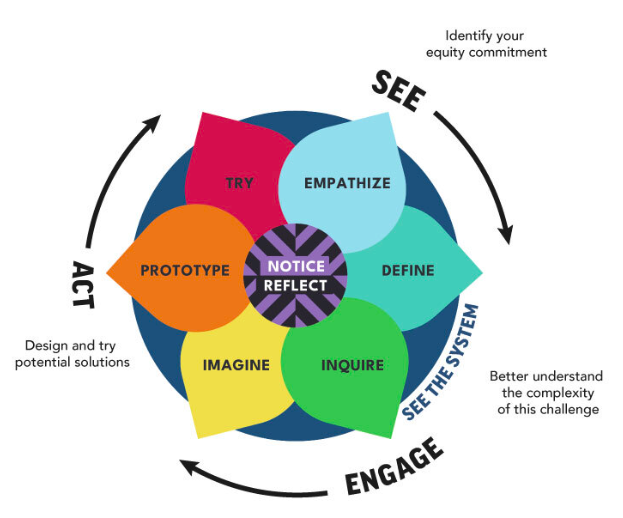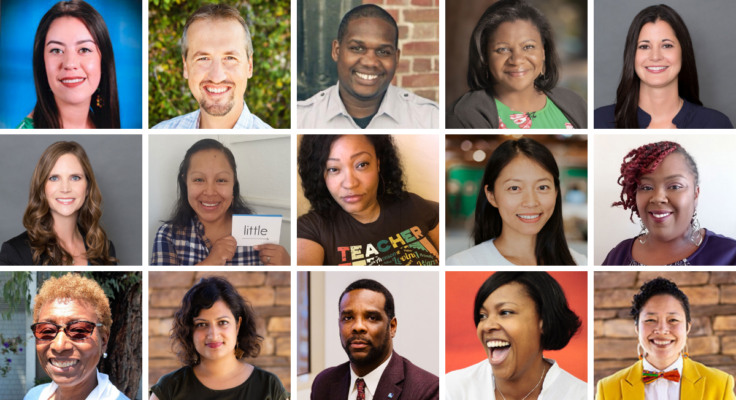In early 2020, without knowing that a global health pandemic was on the horizon, the Kenneth Rainin Foundation’s Education team was developing a plan to better understand the systems and policies impacting Oakland’s early learners to devise right-fit solutions. The vision was for a group of community members that could help us be more responsive and strengthen our Education strategies. What emerged was a Community Strategy Council for Educational Equity and Excellence that helped guide our grantmaking during the pandemic and brought essential knowledge to our strategies. In this blog, we share how the Council’s focus evolved to inform our strategies and policies, along with three lessons that helped the Council and our work progress.
How The Council Started
The Rainin Foundation partnered with the National Equity Project to support convening and facilitating this Community Strategy Council. After successfully partnering with the National Equity Project on a previous project and attending their equity trainings, we knew their role would be essential to holding an intentional, equity-focused space. The Council was a configuration of community leaders, teachers, school leaders, administrators and literacy coaches working within the landscape of public education in Oakland. To ensure a more diverse set of perspectives, Council members were grantees as well as community partners we were new to working with. The Community Council and our staff worked together to elevate ways in which we could be more responsive to community needs and desires. There was also a heightened need for far-reaching, effective strategies to expand access to high-quality, culturally relevant education.
Shortly after the Community Strategy Council’s first meeting in March 2020, the pandemic’s shelter-in-place orders forced severe disruptions to schooling and childcare, along with children’s access to meals and social interaction. The pandemic exposed racial, social and economic disparities. The lived experience, relationships and leadership of this group informed and energized our response to have the greatest impact on Oakland’s children.
“As a Council member, I engaged in meaningful conversations and a liberatory design framework that deeply informed my evaluation and engagement efforts as a nonprofit director. Now, as the Foundation’s Education Program Officer, this work helps me ensure our grantmaking is rooted in community perspectives and leads to equitable impact.”
Dana Cilono, Kenneth Rainin Foundation (formerly FluentSeeds)
Embracing Community Knowledge
An early priority for the Community Strategy Council was to provide feedback on our draft Education strategic plan. The value of the Council’s input was immediately evident, they helped us to better understand community perceptions and desires of their organizational work. Together, they helped us co-design equity-focused strategies that are at the heart of our approach to improving outcomes for children from birth to eight years old. This first phase was filled with such impactful reflections and suggestions, we knew we wanted to go deeper.
Whereas the first body of work of the Community Strategy Council’s work was centered on the Rainin Foundation itself and how to improve its strategy, the next phase of the work decentered the Foundation. This refocusing led Rainin Foundation staff to work alongside other Council members to explore a shared equity challenge and ways to embed equitable practices in our collective work.
Interrogating How to Share Power And Decisions With Community

Having identified numerous equity and ecosystem challenges throughout the first year of convening, the Council zoomed in on one specific challenge in their second year—”Rethinking the Table.” The group wanted to interrogate what the Foundation and similar organizations can do to share power with the communities they serve—often Black and Brown community members—rather than making decisions for them. The National Equity Project facilitated the group to engage in its Liberatory Design process, which guides teams to approach their work in the following equity-enhancing ways:
- Create designs that help interrupt inequity and increase opportunity for those most impacted by oppression
- Transform power by shifting the relationships between those who hold power to design and those impacted by these designs
- Generate critical learning and increased agency for those involved in the design work
With the Liberatory Design process added to everyone’s equity toolboxes, Council members gained a new framework to support the progress of their work. And reciprocally, the Community Council supported us in understanding how we can be more effective partners to Black and Brown community members by better understanding how to shift power. This work around Liberatory Design has helped position both the Foundation and Council members to play more effective roles in achieving more equitable outcomes for children and families in Oakland.
Three Lessons On Convening, Communication And Power
1. Convening around a shared goal in an intentional, equity-focused space increases collaboration
The Council offered an opportunity for people working in the same field—for the same communities and facing many of the same challenges—to come together around a shared goal in an intentional, equity-focused space. Despite all working in public education in Oakland, the members of the Council haven’t always had opportunities to work collaboratively with one another. Educational systems are often siloed and create competition for resources among folks who could much more efficiently achieve their goals if they were instead encouraged to work together. Our convenings helped to strengthen relationships, which we hope will translate into more impactful, broader-reaching wins for students and families in Oakland. As a result of this work, we recognized that early childhood conversations are continually happening in many spaces across the city. We remain committed to learning from our community by hosting convenings and remaining active in the community and these ongoing conversations.
2. Creating two-way communication closed gaps in mutual understanding
“Grantees expressed the impact of conventional funding conditions with a funder—not a particularly common occurrence.”
Woo Williams-Zou, National Equity Project
The council was designed so that our Education team participated in each convening and was in conversation with grantees and partners. This structure facilitated a two-way communication and feedback loop that helped close gaps in mutual understanding. Our intent was to become more responsive and invite direct input on our practices and how to improve moving forward. We’re grateful that Council members shared the impacts of things like short-term funding for long-term work, conditional funding and complex reporting requirements, offering that it’s difficult to feel safe-to-fail or even safe-to-experiment when they have to be able to demonstrate that they’ve met grant conditions. We heard that providing grantees more space for exploration, failure and learning will better serve the goals of their work. As a result of these conversations, we streamlined the application process and provided more multi-year grants to reduce administrative burdens for grantees.
“The experience of co-designing and facilitating the Community Strategy Council illuminated the importance of foundations being in this type of conversation, structure and relationship with their grantees and community partners.”
Asha Sitaram, National Equity Project
This two-way design was an evident and impactful element of the Council’s progress and our work co-designing equitable strategies. National Equity Project consultants Asha Sitaram and Woo Williams-Zou both underscored the power of this unique two-way communication. The experience of co-designing and facilitating the Community Strategy Council illuminated for them the importance of foundations being in this type of conversation, structure and relationship with their grantees and community partners.
“The Community Strategy Council experience reminds me that engagement must be ongoing. A static understanding of an evolving community’s perspective quickly becomes out of sync with their reality and needs.”
Kareem Weaver, Oakland NAACP
3. Acknowledging power and prioritizing freedom of expression was essential
As a funder, we must recognize the power we hold and that it can be challenging for current or potential grantees to be openly critical of our work. So, in addition to prioritizing relationship building, the National Equity Project facilitators took other measures to encourage comfort and freedom of expression during the convenings. For example, when members of the Council were sharing feedback about the Foundation’s practices, facilitators ensured that there were no Rainin Foundation staff members present for that portion of the conversation. We are committed to soliciting feedback to improve how we work and to build trust and strengthen relationships with our community. Moving forward, we will embrace two-way feedback with the community as we continue using the Liberatory Design Process of seeing a challenge, engaging in conversation with the community to understand the challenge, prototyping solutions and getting community input on the prototypes to iterate. This process is informing equitable shifts in our grantmaking strategy and practices.
“There are no shortcuts, and the Community Strategy Council has instilled in me the need to develop relational trust and commit to transforming power.”
Hana Ma, Sobrato Family Foundation (formerly Education-Trust West)
Implementing Learnings For A More Equitable Future
We are so grateful to each member of our Community Strategy Council for helping us strengthen our strategies and grantmaking to address the interrelated systems that affect how children learn. While the Council’s work concluded in November 2021, we continue to implement learnings and shift our practices to build more trust and to be better partners to Black and Brown community members. This year our Education Team is exploring ways to shift power to our community through more participatory grantmaking and democratic decision-making and we hope to share more news about this in 2023. We remain committed to investing in promising ideas and approaches that promote equitable results for Oakland’s children and that are created by and for the communities we support.

